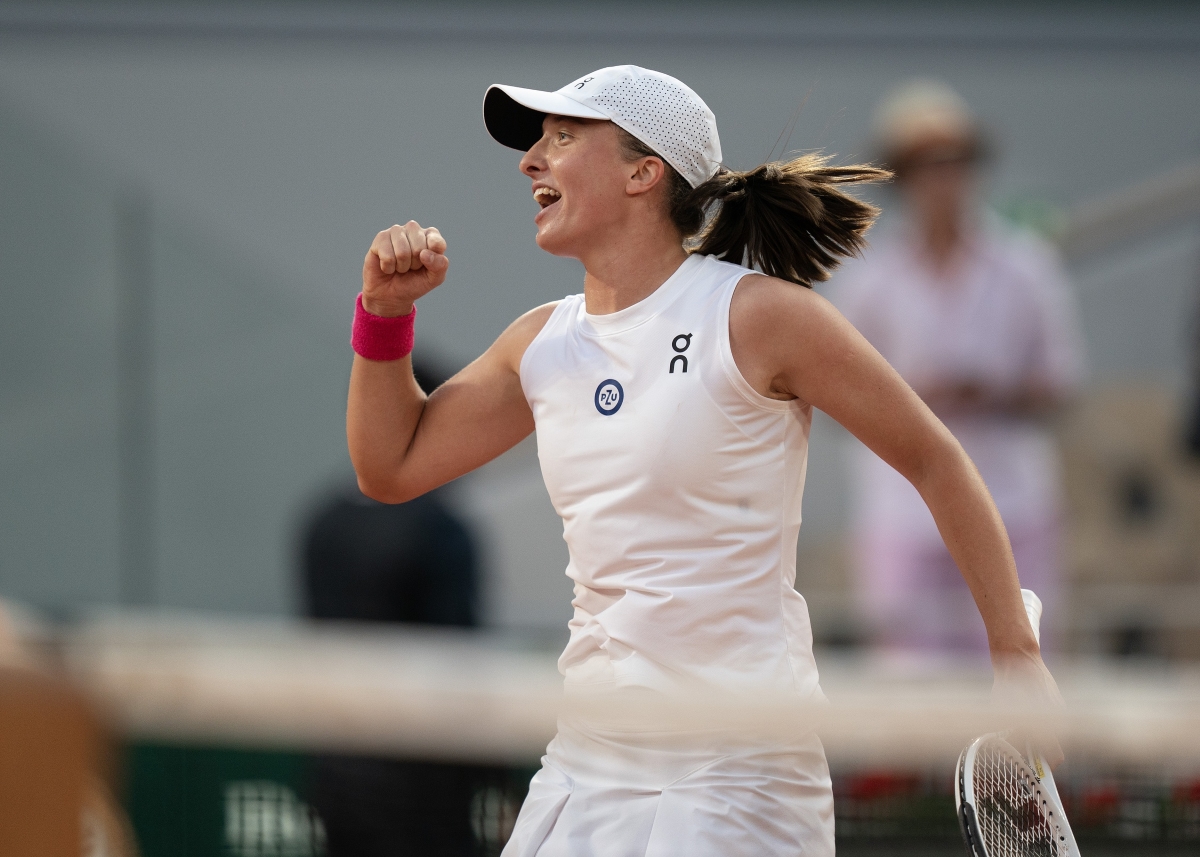On Saturday Iga Swiatek lost narrowly to Coco Gauff in the semifinals of the Cincinnati Masters. Although a second defeat in a row in the semifinal of a Masters event is tough to take for the Pole, she has still gained valuable preparation for her US Open title defense.
But last week Swiatek’s words off the court created at least as many headlines as her tennis on it. The world #1 spoke of abuse she and her team have received online, even after victories. The candid words of Swiatek seemed to take many in the media by surprise, and her comments were heavily publicised.
Yet I feel the media response as a whole has been somewhat disappointing. This does not apply to all outlets, far from it, but most of the coverage has been underwhelming. There has been much reporting of the four-time Grand Slam winner’s words to spark user engagement. But there has been very little deep reflection of the issue Swiatek raised: the of the scourge of online abuse. Just how widespread has it become? Who is most likely to be targeted? Are female athletes more prone to it than their male counterparts? And what can be done about it?
I am not an expert in the topic of online abuse. However, I have written this article having read as much research as I can from those who are. Hopefully it can provide useful information to readers. And maybe even discourage some of those considering posting hateful comments online.
What Exactly Did Swiatek Say?
The three-time French Open champion made her comments after beating Qinwen Zheng in the Round of 16, 3-6 6-1 6-1. Despite comfortably winning the last two sets, she hit out at the abuse she and her team face, even after victories.
Swiatek said the following: “Today’s match wasn’t perfect, we all saw that. But the amount of hate and criticism me and my team get after losing a set is ridiculous. I want to encourage people to be more thoughtful when they comment on the internet. We all sacrifice a lot. We’re all working really hard to be in that place. We’re always giving 100 percent. It’s sad for me to see that people I work with and myself, we’re really judged. I’m putting a lot of energy for it not to hit too deeply, but I realized that sometimes people- I don’t know if they’re my fans or not but they want me to play better. It causes me to waste a lot of energy to ignore them.”
The feelings of the recent Warsaw champion were made clear, and expressed eloquently. Before discussing the abuse of Swiatek specifically any further, let’s first take a step back and understand who in a wider sense is most targeted by online abuse. It will help to understand how situations like Swiatek feeling the need to speak out arise in the first place.
Who in Society is Most Likely to Face Online Abuse?
The most recent evidence shows that women are more likely to be victims of abuse on the internet. To be clear, men also suffer much abuse, and that is also abhorrent, and needs to be spoken out against forcefully. But research does show a greater severity for females.
An Ofcom study last year found that 60% of women had online concerns, more than double the number for men. The study also showed that the mental health of women was more likely to be negatively impacted by harmful abuse online. Statista has also come to the conclusion that women tend to encounter more abuse, and are affected more severely.
It is an issue that has also intensified in recent years. This is especially since the Covid-19 pandemic, and the move to an even more digital world. The Washington Post reported on how online abuse directed towards women and girls substantially increased during the two years the pandemic was most prevalent. Another UK study summarized how workplace sexual harassment of women had moved increasingly online, as working from home has become more commonplace.
It is clear that women overall are targeted more. But it is possible to dig even deeper into the demographics.
Which Women in Society are Targeted Most?
Humanitarian organization Plan International did a study across 22 countries and five continents. They found that 58% of young women face online abuse and harassment. This number remained similar across all the regions studied. Women’s Aid also revealed that the surge in online abuse since the pandemic was particularly harmful to younger women. This of course is in no way condoning any unacceptable abuse faced by older women; the data overall just suggests it happens less often.
Research has also shown that Black women are even more impacted than white women. A 2018 study from Amnesty International revealed that women of color are 84% more likely to be sent hateful tweets than their white counterparts. Such a wide disparity is shocking. Subsequent reports looking at different forms of online abuse support the findings of what was an important and landmark report from Amnesty.
There is much detailed and excellent work that can be read about this issue. But broadly it is clear women, and especially young women and women of color, are most targeted. Now we can look more specifically at the data relating to athletes.
The Targeting of Female Athletes
Research has demonstrated overwhelmingly that female athletes receive more hate online than males. A study from World Athletics disclosed that women competing at the 2021 Tokyo Olympics received 87% of all online abuse, in what was one of the most shocking reports I had ever read. In addition, females experienced 60% of all the abuse at the 2022 World Championships. Some may be slightly encouraged that the number is lower than the Olympics was a year previously. In reality, online haters and trolls are far more prevalent for huge events like the Olympics, even though the World Championships is big in its own right. Female athletes being more targeted at the Olympics when online trolls are most active is very telling.
The Tokyo Olympics study also backed up the work about the targeting of Black women. An extraordinary 63% of all the abuse was directed at just two unnamed athletes, both of whom were black. Also 20% of the online abuse at the 2022 World Championships was racial. The specific targeting that often takes place is absolutely clear and undeniable.
Having a framework of understanding about the abuse of female athletes allows us to now analyse tennis players specifically.
Online Abuse of Tennis Players
World Sports Network carried out research in May of this year that gave a comprehensive overview of online abuse in tennis. Their findings were that female players received more online abuse than male players. However, the difference was quite narrow overall, and the effect that hatred online has for men should also be taken very seriously. Novak Djokovic and Stefanos Tsitsipas were the ATP players found to undergo the most abuse. The top five WTA players were: 1. Aryna Sabalenka 2. Elena Rybakina 3. Caroline Garcia 4. Iga Swiatek 5. Coco Gauff. Those are five of the current Top 7 in the WTA rankings, demonstrating how the top players are targeted.
That is one general study this year, but female players have spoken about the persistent abuse they have sustained throughout their careers. For instance 2017 US Open champion Sloane Stephens said the disgusting online racial abuse she has been the target of her whole career is getting worse, not better. Coco Gauff has said similar things. British players Jodie Burrage and Harriet Dart have also talked about the issue of online trolling and hatred. And four-time Grand Slam champion Naomi Osaka was shown to be the most abused tennis player on Twitter in 2021 in a truly shocking and shameful findings from a study.
The problem for women in society, sport and tennis specifically is clear. So let’s now return to Swiatek.
The Abuse of Swiatek and her Backstory
The data discussed previously show how top athletes like Swiatek become victims of online abuse. The Pole is not a woman of color. But she is still a young, successful woman, who is now well known all over the world as a Grand Slam champion, and the #1 player in the world for over 70 weeks now. That profile unfortunately makes her a likely target.
It is also important to consider Swiatek’s backstory when considering the effect online abuse can have. I wrote previously about why Jimmy Arias was so wrong about Swiatek when he stated she was not good for women’s tennis. In that article I discussed how the four-time Grand Slam champion was an extreme introvert until the age of 18. Although not as severe now, and the World #1 always speaks excellently (as she did when highlighting the issue of online abuse), she is still naturally more introverted than many sport stars.
To be absolutely clear: I am in no way saying that Swiatek is somehow less able to handle herself or the hostilities that come from some towards top athletes. Indeed the way she has been such an outstanding ambassador for tennis having previously been so intensely introverted is extremely inspiring in its own right. I am simply pointing out that different human beings experience online revulsion in distinct ways. A star who grew up not actively seeking the limelight can feel online abuse in a unique manner. That could be the case with Swiatek, and the world would be a better place if people were mindful of such things.
Swiatek’s World #1 Factor
The study mentioned above about which tennis players get the most abuse is a very good one. It adequately shows that the top players, and top WTA players in particular face the most problems from hateful users online. Swiatek received the fourth most abuse of the women’s players in that research.
But that work is from a specific period; around the French Open. It gives a good indication of the most affected players, but there will undoubtedly be times of the year when Swiatek is receiving the most online hatred. She is the World #1, and her stock has grown further since that study, after winning her fourth Grand Slam at Roland Garros this year. Also her clear and unwavering support for Ukraine undoubtedly leads to abusive comments. This can come from bot accounts, or those who argue politics and sport should never mix.
Swiatek’s long period as world #1 is a remarkable achievement. However, it comes with the burden of periods of negativity online. Managing that, along with being the best female tennis player in the world for over a year, has to be a great strain. That is why Swiatek deserves nothing but respect for speaking out on this issue.
Trolls, but Also Misguided Fans
Many of those who engage in abuse online do so deliberately. A considerable proportion of these accounts are bettOrs. Ons Jabeur described them well recently, whilst supporting Swiatek’s words. She said: “They have nothing to do in their life, and they are just spending money on you, and probably, what, they lost a couple of bucks on Iga losing a set. It is frustrating, but it’s the reality. I believe these people should not exist.”
Such calculated abhorrence on the internet is a sad reality. But some of the problem also comes from unwitting individuals who believe themselves to be fans of Swiatek. I have used much external research in this article. But much anecdotal experience can be used in relation to this point. I am a self professed huge Swiatek fan. She is one of my favourite ever tennis players, and I feel I can relate and be inspired by her backstory. However, observing some of the things said online from some fellow supporters of Swiatek can be a shock. It is certainly a small minority, and does not represent the vast majority of her fans. But it is still too many.
This explains why the 22-year-old is unsure if negative comments are from her fans. Often they can be. It was not just after her win against Zheng that such views were visible. For example last week in the first round of Montreal, Swiatek defeated Karolina Pliskova in straight sets in difficult windy conditions. Yet rather than reflecting on a positive start with areas to improve, some accounts from fans of the Pole were at times scathing in their critiques of someone they claim to love. Fans can express opinions, whilst not only focusing on the negatives for no good reason.
What Can be Done About Online Abuse?
There is only so much individuals reading this article can do about online abuse. Reporting accounts engaging in particularly egregious behaviour is always an option of course. But we are very reliant on systemic changes. Some governments have and others are considering bringing in tougher laws in relation to hate speech online. That has caused some division, but the impulse to do so is understandable.
Some sporting bodies have tried to use technology as an intervention. For example this year the French Open took a positive step of offering players the Bodyguard technology, which claims it can filter out and block abusive messages within 200 milliseconds. Swiatek used that technology during her successful Roland Garros run, and described it as a positive step.
Hopefully more helpful systemic steps are taken. But what is the best thing we can do as individuals? Spread love and positivity. Show your favorite player some encouragement, and push back against those engaging in scathing critiques. You never know how much your support might mean to the person, who could be going through something none of us know about. Trolls will always be a reality to some degree. But creating a positive culture can make some people more hesitant to engage in negative antics.
Fans are always entitled to an opinion. But discourse would be a lot better if it were done respectfully. Swiatek, in her eloquent words, was not asking for fans to stop any debate. But to be mindful and respectful in how it is done, and to not needlessly focus on pessimistic aspects, or to have unrealistic expectations.
Main Photo Credit: Susan Mullane-USA TODAY Sports






